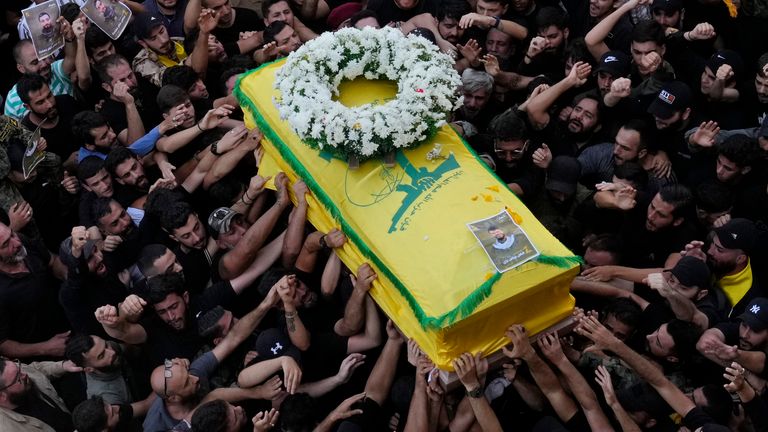
Sonic booms shook buildings over Beirut during the televised speech by Hezbollah leader Hassan Nasrallah as Israeli jets flew over the Lebanese capital.
A funeral in Beirut for a Hezbollah member killed on Wednesday when a communication device exploded. Pic: AP
Hezbollah’s leader has accused Israel of carrying out “massacres” with pager and walkie-talkie explosions, saying it wanted to kill “5,000 people in two minutes”.
Lebanon has blamed Israel for the blasts on Tuesday and Wednesday which have killed at least 37 and injured thousands.
Hezbollah leader Hassan Nasrallah said the “unprecedented” explosions “could be called a declaration of war” as he accused Israel of “violating red lines” and threatened to retaliate.
Meanwhile, across a two-hour period late on Thursday, Israel’s military said it struck hundreds of rocket launcher sites in southern Lebanon, in the first major attack since the blasts earlier this week.
Middle East latest: UK foreign secretary calls for ‘immediate ceasefire’
Nasrallah said 4,000 pagers carried by Hezbollah members exploded in hospitals, shops, cars and streets “where many civilians were” on Tuesday.
A thousand walkie-talkies exploded the following day.
Israel has not directly commented on the attacks which, according to security sources, were probably carried out by its Mossad spy agency.
During Nasrallah’s speech, in which he called the blasts an “unprecedented blow” and a “test” for Hezbollah, sonic booms were heard over Beirut which shook buildings.
Sky’s international correspondent John Sparks, who is in the Lebanese capital and heard the sound, said Israeli jets could be seen over the city.
He described it as an attempt by Israel to remind people in Lebanon of their presence and military power.
In another apparent reminder, Israel said its warplanes struck southern Lebanon on Thursday.
In a statement, the Israel Defence Forces (IDF) said: “Over the last two hours, directed by IDF intelligence, the IAF [Israeli Air Force] struck hundreds of rocket launcher barrels that were ready to be used immediately to fire toward Israeli territory.
“Since this afternoon, the IAF has struck approximately 100 launchers and additional terrorist infrastructure sites, consisting of approximately 1,000 barrels that were ready to be used in the immediate future to fire toward Israeli territory.”
They threatened to continue targeting Hezbollah on the back of recently declaring a “new phase” of the war.
Reacting to the Hezbollah leader’s speech Jon Sparks said: “Somewhat cryptically, he [Nasrallah] said that the attacks on Tuesday and Wednesday would be met with a ‘just punishment’. He’s certainly under pressure from his members to do that. He didn’t spell out what that punishment was going to look like.”
Nasrallah claimed Hezbollah’s top officials do not carry the model of pagers which exploded and “what happened did not impact our command, control or infrastructure”.
He also spoke about the tit-for-tat war with Israel since 8 October around the south Lebanon border, adding that the conflict was causing Israel “pain” and would continue.
Amid the growing tensions and escalations, UK Foreign Secretary David Lammy repeated calls for an immediate ceasefire.
He made the comments during an official trip to Paris, where he is meeting other foreign secretaries, including Italy and Germany, as well as US secretary of state Antony Blinken.
Meanwhile, the US is “afraid and concerned about potential escalation,” White House spokesperson Karine Jean-Pierre told a briefing.
‘A crushing response’
That fighting continued on Thursday – the Israeli military reported two of its soldiers were killed in the north of Israel.
Israel’s N12 News said one of them was killed by a drone and the other by an anti-tank missile fired by Hezbollah across the Lebanese border.
Meanwhile, Iranian state-run news agency IRNA has issued a statement from Iran’s Revolutionary Guards commander Hossein Salami, who has been reacting to Nasrallah’s speech.
He is quoted as saying Israel will face “a crushing response from the axis of resistance” following blasts targeting Hezbollah’s communication devices.
The blowing up of Hezbollah pagers and walkie-talkies was a “very sophisticated, very accurate” attack, according to an Israeli intelligence expert.
Major Avraham Levine, from the Alma Center, told Sky News the “blame was immediately put on Israel” and the “surgical” strike suggests “someone is deep into Hezbollah’s communications systems”.
